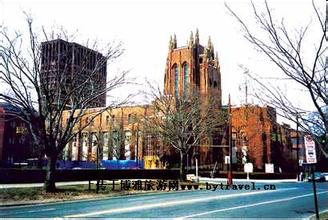1828年耶鲁报告
Due to the industrial revolution and the increase in agriculture in the 19th century, there were many changes that affected higher education in the United States. Issues in controversy include: Church versus state control of higher education; the value of the college versus that of the university, and classical curriculum versus elective courses. The last issue mentioned will be the concern here.
19世纪,随着工业革命的发展和农业的进步,出现了许多新的因素,冲击着美国的高等教育。其中包括:高等教育应由教会控制还是地方政府控制,学院与大学谁的价值更高,以及古典学科与选课系统的矛盾。此处将讨论的正是古典学科与选课系统的矛盾。
To meet the varying demands of the community, as well as to accommodate the course of instruction to the rapid advance of the country, there was a gradual movement toward a more open, elective course of study at colleges around the United States. Advocates for change believed that curriculum should offer vocational education so as to prepare a man for living, and the curriculum should be relevant to commerce, industry, and agriculture. In this way, students would be able to pursue a specific plan of study so that he could learn a trade and become a positive contributor to the community in which he lived. In addition, they criticized Latin and Greek to be "dead languages" which should be replaced by practical courses. On the other side of the debate was the view that traditional curriculum should stay, called the "conservative view". Yale leaders are the representatives.
为了适应社会不断变化的需求,为了使大学的教程跟上国家前进的步伐,美国各地高校渐渐掀起了一场倡导开放式教学、实行选课制的浪潮。变革派坚持认为,大学课程应该提供职业化教育,教人谋生的本领;授课内容应该涉及商业、工业、农业,这样,学生在校期间便有一个明确的学习计划,如此才能学精一个行业,成为一个能为其所属集体积极贡献力量的人。此外,变革派还批判拉丁语、希腾语为"死了的语言", 建议由实用学科取代这些课程。与之相反,有些人认为应该保留这些传统学科,因而被称作"保守派"。耶鲁大学的校领导是这一派的代表人物。

In September, 1827,Yale president Reverend Jeremiah Day organized a group of professors to discuss the future of classical curriculum. The Yale Report of 1828,being the resolution of the committee of the Yale corporation, was issued to rebut critics who were challenging the classical curriculum. It was made out in two parts: one containing a summary view of the plan of education at Yale and a general discussion of the nature of liberal education, composed by the President Jeriemiah Day; the other, an inquiry into the expediency of insisting on the study of the ancient languages, argues for the retention of Greek and Latin literature in the college curriculum, written by professor James L.Kinsley. It was firstly issued in American Science and Art Journal as A Report on the Course of Liberal Education, later on called The Yale Report.
1827年9月,耶鲁大学校长杰里迈亚.戴牧师组织一批教授研讨古典学科的去留问题。次年,发表了著名的《1828年耶鲁报告》。耶鲁集团董事会通过这项报告,就是为了反驳那些挑战传统学科地位的人。报告共分两部分:前一部分主要对学院教学 计划进行考察分析,讨论自由教育的本质,由院长杰里迈亚·执笔;后一部分是为古典语文教学辩护,论证保留希腊、拉丁文学的必要性和可行性,由詹姆斯L·斯利教授执笔。这个报告最初发表在《美国科学与艺术学刊》上,题为《一份关于博雅课程 的报告》,后来,人们习惯称之为《耶鲁报告》。













